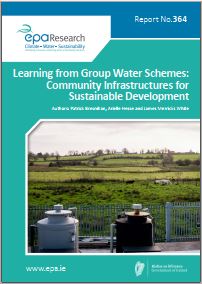Research 364: Learning from Group Water Schemes: Community Infrastructures for Sustainable Development
Authors: Patrick Bresnihan, Arielle Hesse and James Merricks White
Summary: The quality of many of Ireland’s freshwater sources is declining, impacting in turn the quality and affordability of Ireland’s drinking water services. This project examines the history and development of the group water scheme sector, identifying how and why it has been successful in providing essential water services to rural Ireland, and providing several key findings that have implications beyond the rural water sector.

Water quality :: Environmental Protection Agency, Ireland
https://www.epa.ie/media/epa-2020/publications/research/Thumbnail_364.jpg